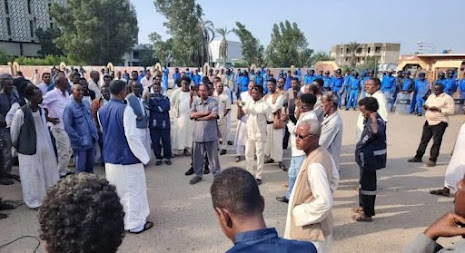The ports of Port Sudan are facing a severe humanitarian crisis due to the government’s disregard for workers’ rights. On Tuesday, a union official announced that approximately 15,000 port workers have not received their financial entitlements. This crisis is not due to a lack of resources but rather new financial policies that force workers to use banking systems that do not align with their daily realities.
Banking Policy and Its Impact on Workers
In light of a decision by the Council of Ministers and the Central Bank of Sudan, all companies and government institutions are required to pay wages through bank transfers and digital banking applications. A large segment of workers has found themselves unable to access their entitlements. Most port workers lack the necessary documentation to open bank accounts and face difficulties using banking applications due to insufficient training or infrastructure.
This decision, which failed to consider the workers' unique circumstances, has caused a significant decline in productivity. Jaafar Tahir, a member of the Port Sudan Loading and Unloading Workers Association, reported that daily production has dropped from 5,000 bags to only 600 before operations came to a complete halt last Wednesday.
The Strike: A Cry for Help
With work halted at the port, the situation has become increasingly complex. Unions have warned that the ongoing strike will lead to significant financial losses, not only for the workers but also for the state, which relies on the port as a vital hub for receiving humanitarian aid. On Tuesday, two ships loaded with humanitarian aid entered Sudanese territorial waters. However, with operations at the port suspended, authorities may have to resort to alternative ports in neighboring countries.
Workers and Hunger Amid War Policies
Meanwhile, military and government leaders, led by Abdel Fattah al-Burhan and Finance Minister Jibril Ibrahim, continue to spend public funds on purchasing ammunition and drones from Iran to attack civilians. At the same time, workers in Port Sudan are struggling with hunger due to unpaid wages. This stark contradiction highlights the state’s failure to prioritize its people’s basic needs.
Workers’ Rights: A Humanitarian Issue Requiring a Fundamental Solution
The squandered rights of Port Sudan workers are not a passing issue. In an increasingly advanced world, workers are forced to strike to demand their basic rights, which should be guaranteed without disputes. The current crisis reflects the state’s bankruptcy, not only economically but also morally, as funds are wasted on war while workers are left to face an uncertain fate.
With funds flowing into the military, the Sudanese people ask: When will workers be able to live with dignity? A government that squanders money on arming an army used against civilians shows its disregard for the well-being of its people. Revisiting wage policies and achieving social justice should be top priorities to save the country from total collapse.
The suffering of Port Sudan workers is a call for all national and international parties to intervene and end this tragedy. The government must revise its financial policies and ensure that workers receive their rights without bureaucratic complications. Additionally, the international community must pressure the Sudanese government to redirect resources toward improving citizens' lives instead of fueling the machinery of war.
The continuation of this crisis will only lead to further deterioration, not just in Port Sudan but across Sudan. It is time to raise the voice of justice and humanity above all else.

